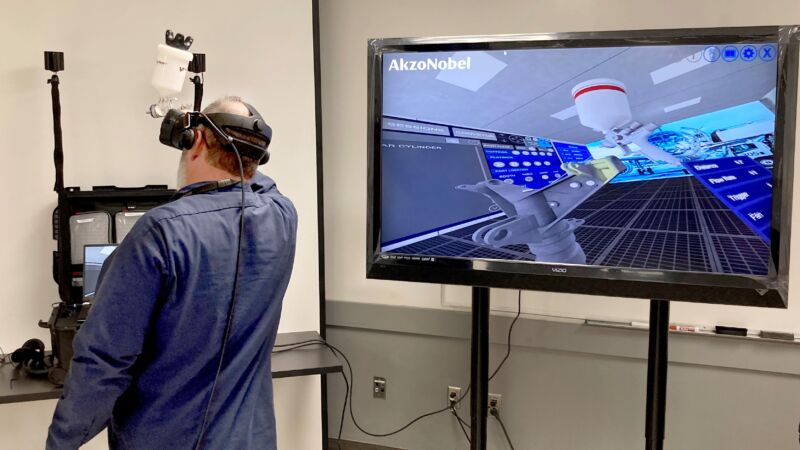AkzoNobel Aerospace Coatings is partnering with American Airlines to utilise virtual reality (VR) technology to provide a new way of training apprentice painters and upskilling existing teams.
The VR platform mimics a customer’s production environment and multiple coating systems to train teams virtually. A VR headset immerses the American Airlines’ trainee in a virtual paint booth, completed with the aircraft part to be coated.
The platform is said to be “significantly more efficient and sustainable” than the airline’s previous training regimes.
The system can be programmed with various paint specifications, such as the thickness of the coating required, and as the operator uses the spray gun, they can see whether too much or too little paint is used and look for inconsistencies in the way the coating is being applied, AkzoNobel said.
The operator’s core skills are measured, from setting up the spraying session to the distance, angle, and speed at which the gun is used. The feedback is immediate, so trainees can react quickly and change their technique to become more consistent, AkzoNobel added. It shows where runs and sags occur, or where the wet film thickness is not sufficient or the coverage inadequate to deliver a smooth finish. It also helps them avoid common problems such as paint overlap.
For American Airlines, a nose landing gear cylinder was programmed into the system. A cohort of 13 painters of varying abilities were then encouraged to spray the part – without a single drop of real paint being used.
“In a spray booth, we’d have to spray the primer, then let it dry, then measure the results to see how they did – all of which takes time. If we were training 13 painters, we’d also have to have 13 nose landing gear cylinders available to paint,” noted American Airlines’ Terry Lesperance. “With VR, we don’t have any of these challenges. I can train more painters, more quickly, and allow them to make mistakes without it costing me anything.”
AkzoNobel’s Technical Services team supported American Airlines with the training, physically suiting up and using the booth to share their experience and their technique with the airline’s new painters.
“Even for experienced painters, there are real benefits: a painter may have been using a polyurethane paint and need to switch to a Teflon paint or use a paint with a different mix that may be heavier or lighter, and all of this can be programmed into the system to replicate the experience in the spray booth,” said AkzoNobel.
The company’s global technical services manager Matthew Amick said the integration of VR into American Airlines’ training regimen is an example of how it is supporting its customers with meaningful, practical help: “Typically, when a customer asks for training, we have to provide significant quantities of paint, much of which is wasted,” he said.
“By effectively moving the spray booth into the classroom, we completely eliminate waste, reduce costs and unnecessary shipping, and prevent Volatile Organic Compounds (VOCs) from being released. There are also no costs associated with cleaning the spray guns, or the additional VOCs releases from the solvents required, or providing the panels needed for wet paint training. It’s a ‘win win’ for all involved.”
